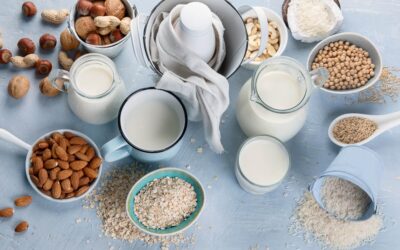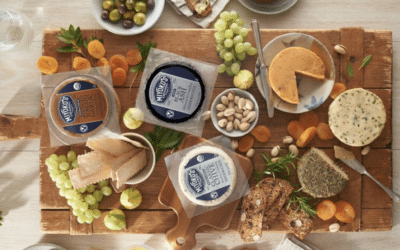How many plant milks are there? The answer is limitless! Personally, I opt for the store-bought varieties, but with a cheesecloth or a super nifty Almond Cow machine, you can transform literally anything into delicious plant milks—from grains to seeds to nuts and everything in between. During the 8 years I’ve been dairy-free, I’ve come across plenty of varieties—some I’ve loved, others I could do without, and some I haven’t even tried yet. From the super accessible almond milk to the more elusive spelt milk, here are 17 plant milks you should try at least once.
View this post on Instagram
Dairy-Free Plant Milks
1. Soy Milk
Soy is my go-to choice whenever I order a milk-based espresso drink. It’s rich, thick, creamy, and creates a wonderfully airy microfoam better than any other plant milk on the market. Nutrition-wise, it’s packed with 8 grams of protein and most brands are fortified with calcium and vitamin D, too. Also, soy is not the vile man-boob-sprouting beverage the dairy industry claims it to be. Soy contains phytoestrogens, which are plant-based estrogens that can actually help balance and control your estrogen levels. Cows’ milk, on the other hand, contains actual estrogen because milk is taken from a pregnant cow. In fact, a 2020 study revealed that in comparison to soy, women who drank cows’ milk increased their relative risk of breast cancer by up to 80 percent. You don’t have to fear soy, but I’d definitely stay away from dairy.
2. Almond Milk
This plant milk really started to gain momentum in the 2010s, propelled by the popularity of the now household name, Califia Farms. It’s become almost as accessible as soy milk—you can find it in virtually every coffee shop or grocery store. People caught on to its light, creamy texture and discovered that it also makes for a decently foamy latte. The neutral taste lends itself well to sweet or savory applications, and it’s delicious drunk straight from the glass (or the carton, no judgment here). But what about the water issue? It’s true that almond milk tends to be the most water-dependent of the plant milks, but in comparison to the gross inefficiency of dairy, almond milk is still the superior choice. It takes just over 1,000 gallons of water to produce one gallon of cows’ milk; it takes 920 gallons of water to produce a gallon of almond milk. While the difference may not seem that significant, take into account that almonds aren’t gassy animals that excrete methane and waste into our environment. The waste from a 2,500 herd of dairy cows is equivalent to the waste of a city the size of Minneapolis. Ew.
3. Coconut Milk
Before you reach for coconut milk, it’s important to understand that there are two kinds of—the beverage that comes in a carton or bottle and the concentrated liquid that comes in a can. For smoothies, coffee drinks, cereal and such, reach for the carton or bottle. It’s light, refreshing, and offers just a hint of coconut flavor. Canned coconut milk is super thick (almost spoonable) and packs a bold coconut taste. I use this variety for veggie-loaded curries, soups, and sauces. Pro tip: stick a can of coconut milk in the fridge for a few hours, scoop off the solid portion, and blend with a bit of vanilla and powdered sugar for a stellar dairy-free whipped cream!
4. Oat Milk
Oat is the new almond milk. Popularized in the US by the Swedish brand Oatly, this luxuriously creamy plant milk gained a cult following by popping up in third-wave coffee shops, but now this delicious beverage is sold by numerous brands in grocery stores nationwide. It froths like a boss and makes an exceptional milk-based espresso beverage. Oat milk is also fortified with essential vitamins and nutrients. For example, the Oatly brand contains 25 percent of one’s daily calcium, 20 percent of one’s daily vitamin D, and 50 percent of one’s daily vitamin B12. It also contains three grams of protein, among other essential nutrients. Note: oat milk is higher in calories compared to other plant milks, coming in between 90-160 calories, depending on the brand. Great for those looking to bulk up, not so much if your goal is to slim down.
View this post on Instagram
5. Hemp Milk
Admittedly, I thought hemp milk was a bit too “hippie—” until I found out it has some pretty solid nutritional benefits. The allergen-friendly plant milk is devoid of gluten, soy, and nuts, making it ideal for those with food sensitivities. Like oat milk, it is also fortified with vitamins and minerals such as vitamin B12, calcium, and vitamin D. However, its omega-3 and omega-6 properties make it unique amongst the plant milks. It’s not my go-to plant milk, but I’ve certainly enjoyed it over a bowl of granola.
6. Spelt Milk
This is one of those aspirational plant milks. You’d be hard-pressed to find it in stores, but if you’re a do-it-yourselfer, you can easily make this at home. Simply blend soaked spelt berries with water, strain it through a cheesecloth, then add a pinch of salt and perhaps a drop of vanilla. It has a unique flavor that spelt-lovers adore, and it’s relatively low in fat and calories in comparison to soy or oat milk. Give it a try and tag Switch4Good on social media to tell us what you think!
7. Rice Milk
Like soy, rice milk has been around for ages. It typically has a thin consistency, which makes it ideal for blending in smoothies or thinning out a dairy-free ranch dressing. It’s a solid allergen-friendly alternative and also low in fat. Rice milk naturally contains a good amount of B vitamins and a hearty dose of antioxidants such as manganese and selenium. Fun fact: before the surge of dairy-free ice creams, rice milk-based ice cream was one of the first to market. I personally have not tried it, but you can still find Rice Dream pints in some stores!
8. Pea Milk
Before you raise an eyebrow, allow me to clarify. This allergen-friendly plant milk is not made from the mushy green peas you were forced to eat as a child; it’s made with yellow split peas. I’ve had my eye on this relatively new plant milk, and it seems to be gaining traction for its smooth taste, thick texture, and high protein content. It contains eight grams of protein and zero sugar, and the leading pea milk brand, Ripple, fortifies its beverages with vitamin D, DHA omega-3’s, B12, and 50 percent more calcium than cows’ milk. You can even find pea milk-based yogurt, creamer, and ice cream now. Keep your eye on it—pea milk may just be the new oat in a year or two.
View this post on Instagram
9. Pistachio Milk
Honestly, I am not a fan of pistachios, but I know that those who love pistachios really love pistachios. This plant milk doesn’t disappoint. It has a slight buttery flavor and adds a bit of je ne sais quois to dairy-free hot chocolate or chai. Pistachio milk tends to be higher in healthy fat than some other plant milks, making it ideal for those looking to put on weight or make gains. I tried the Three Trees brand at an event in 2019 and was pleasantly surprised by it. This store-bought beverage contains four grams of protein and just one gram of naturally occurring sugar.
10. Walnut Milk
This plant milk packs a punch of omega-3s and an exceptional walnutty flavor. It’s also high in antioxidants and essential fatty acids that boost brain power and may reduce one’s risk of heart disease. Walnut milk has become moderately popular, thanks to Elmhurst 1925, and you can find it in many supermarkets. Not quite a walnut aficionado, I prefer baking brownies and chocolate chip cookies with this plant milk; however, I know walnut people who love to guzzle this straight from the glass.
11. Macadamia Milk
I’ve had my fair share of macadamia milk, and unlike walnut milk, the taste is exceptionally neutral. It doesn’t really taste like macadamias, but it’s nice in that it doesn’t overpower whatever food you’re pairing it with. It’s naturally sugar-free and contains an adequate amount of healthy fats (about 4 grams per eight-ounce serving). Store-bought varieties—such as Milkadamia—are fortified with vitamin D, calcium, and vitamin B12.
View this post on Instagram
12. Flax Milk
In full transparency, flax milk is not my favorite. Most varieties are a bit too sweet and the unsweetened version has a very definitive taste to it. However, some people really do enjoy it, and it’s great for those with food sensitivities or those who want to pack in some omega-3s. The Good Karma brand leads the way in the commercial market, offering everything from unsweetened to chocolate varieties in family-sized cartons to kid-friendly single-serve boxes. The unsweetened version is a low-calorie option that’s fortified with calcium, vitamin D, vitamin and B12. It’s typically a hit with kids, so if you’re looking to transition your family to dairy-free, this may be something you want to try.
13. Banana Milk
Would I drink this by the glass? Typically, no. But nothing compliments a substantial peanut butter and banana smoothie like banana milk. Find it on the grocery store shelves by looking for the Mooala brand (the bottle with the cartoon koala on it). The sweet, allergen-friendly milk is fortified with 30 percent of one’s daily calcium and has a delicious hint of cinnamon to it. Beyond smoothies, I’ve also found that it works fabulously in banana bread, muffins, and pancakes.
14. Cashew Milk
Of all the nut milks, cashew milk doesn’t get the attention it deserves. This is my absolute favorite plant milk, and it’s always in my fridge. It’s incredibly delicious, ultra-creamy, and extremely versatile. The unsweetened varieties come in at a low 25 calories per eight-ounce serving, making it ideal for those looking to get leaner. Commercially sold options are also fortified with calcium, vitamin D, and vitamin B12. As a person with a major sweet tooth, I keep it on hand for dunking dairy-free cookies or other sweet treats.
View this post on Instagram
15. Hazelnut Milk
Up your antioxidant and omega-3 intake with a glass of hazelnut milk. This wonderfully nutty nut milk enhances coffee, overnight oats, hot chocolate, smoothies, and more with its rich flavor and impressive antioxidant profile. It’s naturally full of free radical-fighting E vitamins and healthy fats to fuel your brain. At the store, look for Elmhurst 1925 or Pacific brands.
16. Quinoa Milk
Full disclosure: I have not tried it, but in theory, you can make plant milks out of this ancient grain. This plant milk is gluten, nut, soy, and sugar-free, and it’s perfect if you need a project. Make it at home and get the kids involved! Add a splash of vanilla or even a scoop of cacao powder for homemade chocolate milk.
17. Sesame Milk
This addition is brought to you by a Switch4Good supporter who wrote in and raved about sesame milk. I’ve actually enjoyed a sip of the Black Sesame Nut + Seed Milk by Three Trees, but this supporter shared a pro tip: it’s great in coffee. Described as “quite creamy” with a similar thick texture of soy, the Hope & Sesame brand he loves blends beautifully with a cup of Joe. Nutrition-wise, this plant milk is pretty impressive. Sesame milk contains 8 grams of protein per cup (just like cows’ milk), and it’s fortified with 50 percent of the RDA of vitamin D and 30 percent of the RDA of calcium. Who needs a special creamer when you have this nutritional powerhouse to enjoy in your coffee?
Reach out to us on social media and let us know which plant milks are your favorites. Have you tried plant milks that didn’t make our list? We can’t wait to hear from you!
Plant milk is easy to make at home. Give it a try!
Easy Yummy Homemade Oat Milk Recipe








